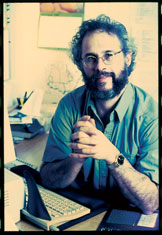|
|
Solving the Plug-in Dilemma |
March 1998 |
Sometimes weeds are simply flowers grown out of control.
Audio DSP plug-in formats are getting to be like a field of dandelions: attractive, beneficial if you know how to use them, but propagating entirely out of control. This is especially true on the Mac platform.
The Mac music-software community has failed, due mostly to competitive rivalries, to create standard real-time DSP plug-in format that runs native on the Power Mac without special hardware. At first, having a real-time plug-in format was a competitive advantage, but now almost every developer is doing it a different way, and we have too much of a good thing. On the Windows side, DirectX is a workable real-time solution. But the technology has limitations, and we still have the Steinberg, Syntrillium and IQS plug-in formats.
I am reminded of the chaos that surrounded synthesizer interfacing before MIDI. Establishing the MIDI spec led directly to the explosive growth of personal studios and the commensurate growth in equipment and software sales. As with MIDI, developer unity can help the entire music-software industry grow.
Clearly we need a standardized, real-time architecture that embodies the best of the existing formats. Ideally, it should also be cross-platform.
The big four who have the technological, political, and financial power to
accomplish this are Microsoft, Adobe, Digidesign, and Apple. But Microsoft shows no signs of releasing an improved, cross-platform DirectX, and Adobe doesn't appear motivated to reinvent its Premiere plug-in architecture. A real-time, improved version of the Premiere architecture is being independently developed, but without Adobe's' live hacking, broad acceptance is unlikely. Digidesign intends to provide a Mac solution by further developing AudioSuite. But the pro-oriented company wants to develop, in essence, the native equivalent of TDM sans hardware, which could take a while. Furthermore, the extent of Digidesign's influence over its development partners is questionable’Äîseveral important host programs don't support AudioSuite, for example’Äîand the company has no real influence on Windows developers.
With its strong links to Macintosh music-software developers, Apple has the best chance of establishing a Mac standard based on QuickTime 3.0 and Sound Manager. Apple's technology is cross-platform, but the company lacks ties with Windows developers, so Windows support will be a tough sell.
The good news is that Apple has finally decided to act. Its engineers have met with developers and have compiled a wish list for a Sound Manager-based, real-time plug-in architecture. At the 1998 Winter NAMM show (two weeks from this writing), Apple will host a meeting to move the issue forward and to address the problem of establishing a cross-platform universal multiport audio-card driver. Development begins in earnest immediately after QuickTime 3.0 ships in February.
It is time for software developers to put aside their rivalries and actively support Apple's efforts. Users and developers alike need to make sure that Apple clearly understands the needs of Mac- and Windows-based musicians. We at EM are willing to offer our good offices as a neutral party to assist in this effort. |
